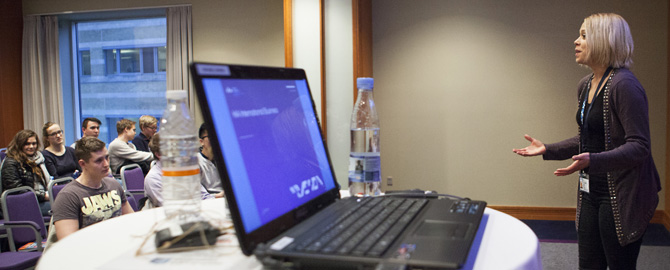Short news

Prize for the longest word at AU
We love using acronyms at AU. But we also use plenty of long words. For instance, the longest Danish word found by the editors so far is “undervisningslokaleadministrationssystemet”, which means “the system used to plan the allocation of teaching rooms”. We are offering a prize to the person who finds the longest Danish word used at AU – and a similar prize to our English readers for the longest English word used here.
Send your words to us – and please attach some evidence to show where you found them! (mga)
Festival of the 19th century
Aarhus University and the Danish University Extension are exploring the 19th century at “Århundredets Festival” on 7-16 March. This was the century of the Industrial Revolution, the age of Kierkegaard and his philosophical thoughts, the period when Hans Christian Andersen wrote his fairy tales. Darwin went to the Galapagos, the American Civil War tore a nation apart, and Denmark suffered a crushing defeat to Prussia in 1864, losing Schleswig, Holstein and Lauenburg.
The festival opens with a party at Godsbanen in Aarhus, and the whole week is devoted to the 19th century. You can go to a philosophy bar at Studenterhus Aarhus, learn about 19th-century advances in natural science, or enjoy the century being served to you on a silver plate in the play “Forestillingen om en historie”. (mga)
Read the festival programme (in Danish)
Ig Nobel Prize at AU in March
The scientific journal called Nature calls the Ig Nobel Prize “the highlight of the scientific calendar”. You can find out for yourself when the founder of the prize, Marc Abrahams, visits AU on 24 and 25 March along with two of the prize-winners from last year and one prize-winner from 2003.
The Ig Nobel Prize was awarded for the 23rd time last year at a gala party at Harvard University. The prize is awarded for research of the slightly curious variety. For instance, Kees Moeliker, who won the prize for biology in 2003, provided evidence of homosexual necrophilia among ducks.
The lecture is one of the public scientific lectures being organised by Science and Technology. (mga)
Read more (only in Danish).
Apply for funding for study and conference trips in the Nordic countries
The aim of Letterstedtska föreningen is to promote a sense of community among the Nordic countries within the fields of science and art. Once a year the Danish office of the organisation awards funding of up to DKK 5,000 per applicant for study or conference trips to one or more Nordic country. The deadline for applications is 15 February.
The head office in Sweden also awards funding of up to DKK 50,000 per project. The money is disbursed to support Nordic conferences, studies comparing Nordic conditions, the printing of academic work which is relevant for the Nordic countries, visits to Nordic countries, and the purchase of Nordic literature. The deadlines for applications are 15 February and 15 September. (mga)
Read more (only in Swedish) about the organisation and the terms and conditions for applying
Give your ideas wings to fly – they might make a difference to society
You don’t need to finish your degree before starting to make a difference to society. Students are the same as anyone else: they too may have the solutions to social problems. That’s what the Forum for Social Innovation Aarhus (FOSIA) thinks. Each year FOSIA arranges Denmark’s largest case competition, with 100 students from many different subjects spreading their creative wings to tackle social innovation based on concrete cases.
This year’s case competition (FOSIA2014) takes place on 1 March in Aarhus. The deadline is 20 February, and the places will be given to the 100 applicants with the strongest motivation.
Read more about FOSIA2014 (only in Danish) (mga)
Associate professor at AU appointed to the Danish Arts Foundation’s funding committee for literature
In January the Danish Minister for Culture appointed Hans Hauge, an associate professor of Scandinavian languages and literature, as a new member of the Danish Arts Foundation’s funding committee for literature.
This was after Jes Stein Pedersen, literary editor of the Danish newspaper Politiken, decided to resign following criticism by the Danish Authors’ Society.
The society felt that there was a conflict of interests because Pedersen reviews books for his newspaper as well as awarding grants to authors as a member of the Danish Arts Foundation committee. (mga)
AU one step closer to digital exams
Aarhus University has joined Aalborg University, the University of Copenhagen, Copenhagen Business School and Roskilde University in signing a joint contract with a company called Arcanic A/S, who are going to develop a joint system for digitising exams.
No date has yet been set for when the new system can be introduced at AU. (mga)
When only perfection is good enough
Good marks are important, as are relevant student jobs. It’s also great to be involved in clubs and societies when you’re a student. But striving to be perfect is sometimes rather exhausting, and it can be difficult to live up to your own expectations – and those of other people.
As a result, the Student Council has organised a course which focuses on the efforts of students to achieve perfection, with a view to turning this into something positive. Jens Munk, a university chaplain at AU, will be teaching the course over three days. The first meeting is on 3 March. (mga)
Translated by Nicholas Wrigley

